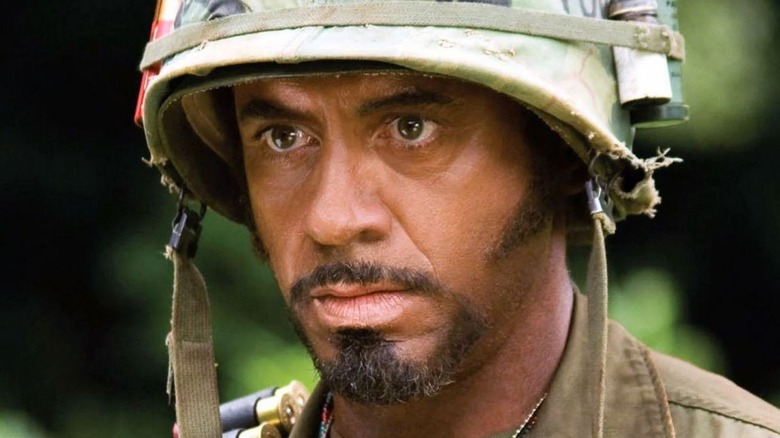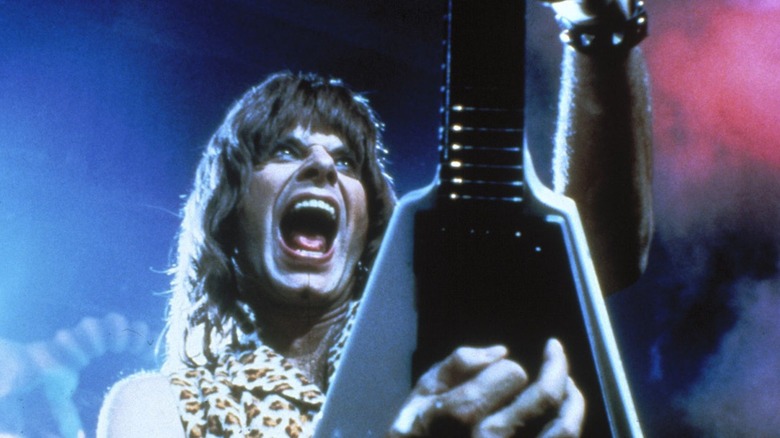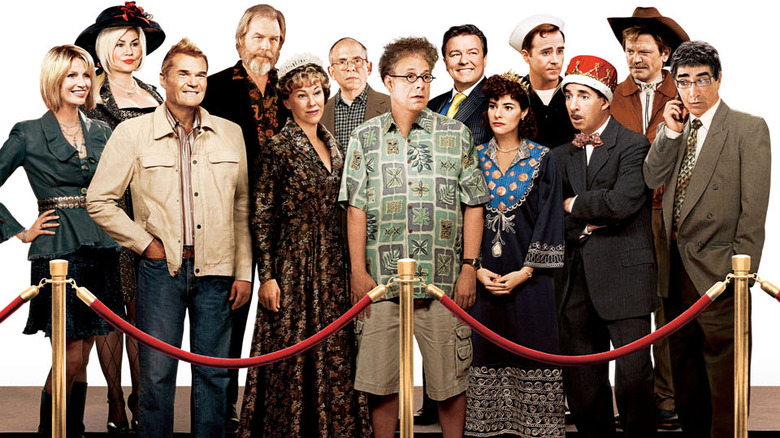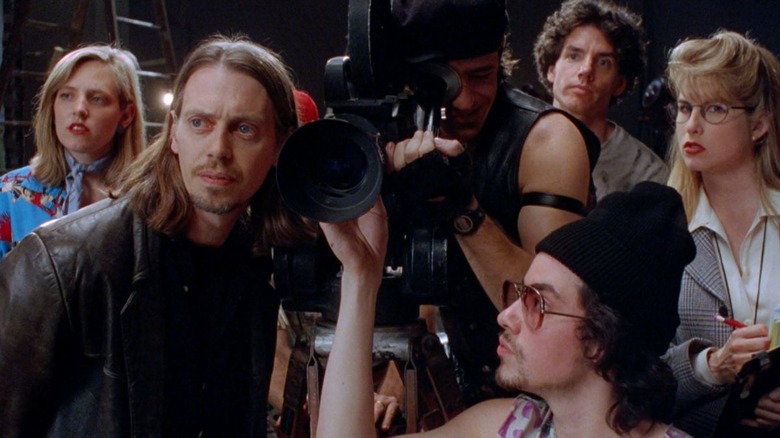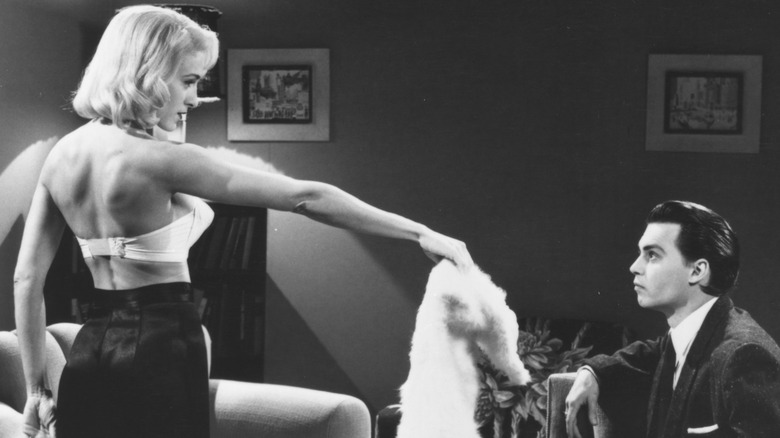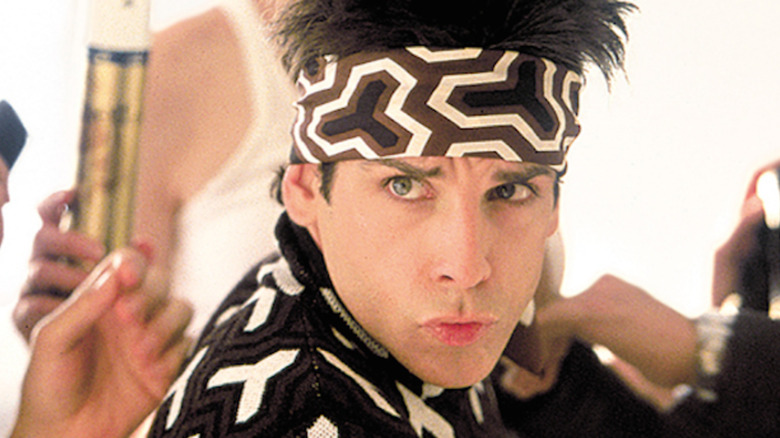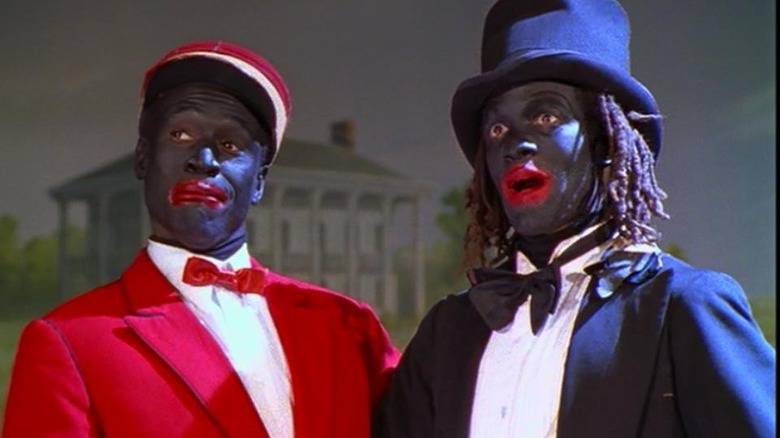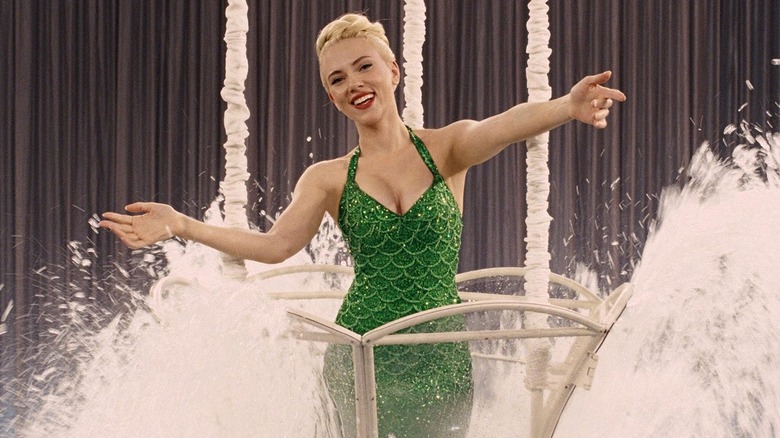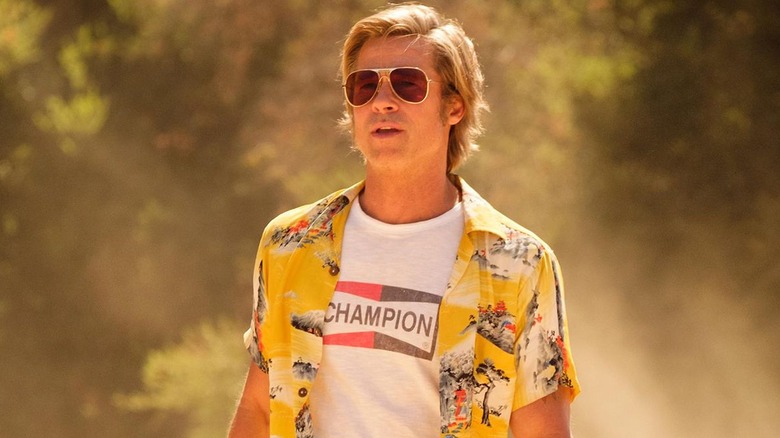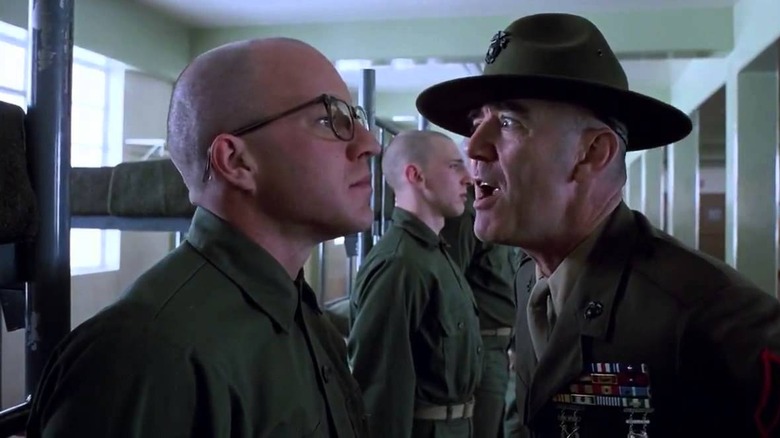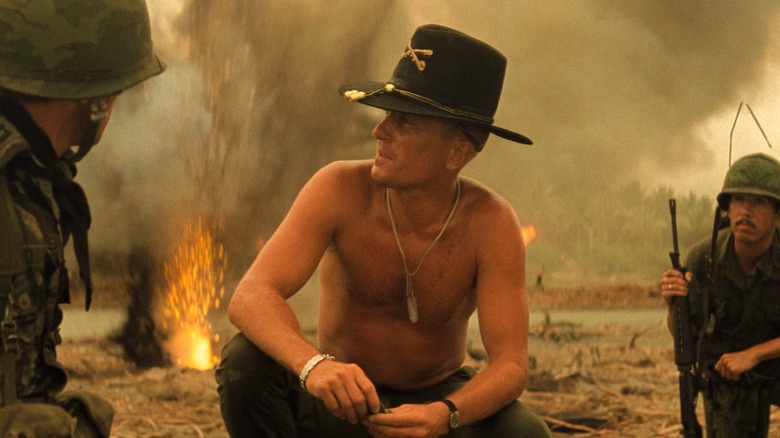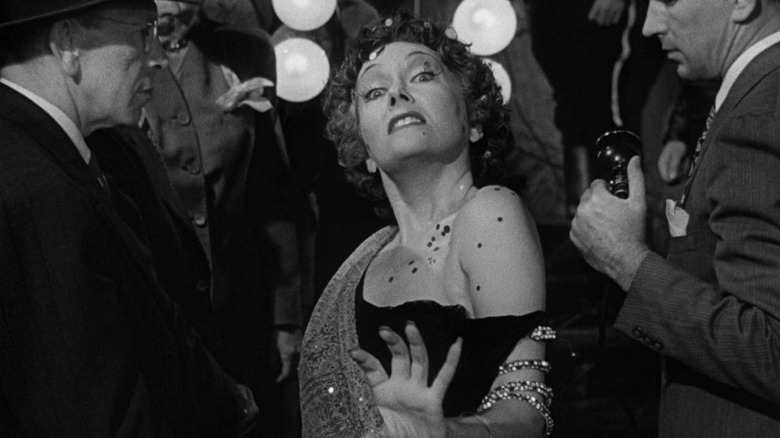Movies Like Tropic Thunder Comedy Fans Need To See
Hollywood loves making movies about itself — but for obvious reasons, most of those movies aren't very funny. Do you like making yourself look stupid on purpose? Of course not.
"Tropic Thunder" is one of the handful of exceptions that proves the rule. The 2008 farce implies that behind every tough-as-nails, hyper-competent cinematic war hero, there lies a pampered, navel-gazing, glory-mongering, emotionally-troubled actor. However, Hollywood actor Ben Stiller probably does not hate Hollywood actors, and would not direct a film that portrays Hollywood actors with excessive harshness. So the cast of its movie within-a-movie — including Tugg Speedman (Stiller), Jeff Portnoy (Jack Black), and Kirk Lazarus (Robert Downey Jr.) — express enough humanity and charm to remain in the audience's good graces. This is essential, because for the movie to work, we've got to care if Speedman and his costars live or die when an ill-conceived attempt to inject some realism into the production goes haywire.
Setting aside some superficial similarities with a lesser-known 1980 Peter O'Toole project called "The Stunt Man," "Tropic Thunder" stands as a mostly one-of-a-kind piece, and a solid performer as far as the critical consensus goes. But if we reverse engineer "Tropic Thunder" and break it down to its individual ingredients, we can point to many other films that check off a few of the same essential boxes.
So if you're a "Tropic Thunder" fanatic and trying to figure out what the heck to watch next, observe these suggestions.
This is Spinal Tap
Perhaps the most enduring showbiz spoof of all time, 1984's transcendent "This is Spinal Tap" has aged quite a bit better than the 1970s and 1980s stadium rock bands it satirizes. Trends and styles might come and go, but as long as famous musicians still make asses of themselves on a routine basis, "Spinal Tap" will remain relevant.
As in the case with "Tropic Thunder," Rob Reiner's directorial breakthrough convinces you to care about its subjects — that's Nigel Tufnel (Christopher Guest) on lead guitar, Derek Smalls (Harry Shearer) on bass, and David St. Hubbins (Michael McKean) on lead vocals and rhythm guitar, plus a parade of hilariously doomed drummers — without making you feel guilty about enjoying a hearty chuckle at their expense...or inexplicable demise.
Much in the way pre-existing knowledge of "Apocalypse Now" (1979) is not required for anyone to understand "Tropic Thunder," you should be able to grasp the jokes in "This Is Spinal Tap" even if you've never heard a Led Zeppelin, Black Sabbath, or pre-"I Don't Want to Miss a Thing" Aerosmith song in your life. And at the risk of editorializing, we must report that whereas "Tropic Thunder," like most blokes, can only crank it up as far as 10, "This Is Spinal Tap" goes all the way up to 11. That's definitely one better.
For Your Consideration
With the possible exception of "Reality Bites" (1994), Ben Stiller's directorial efforts tend to lean into a bombastic, embellished sensibility. There's nothing subtle about "Tropic Thunder," clearly. But there are several subtle things about "For Your Consideration" — a 2006 endeavor written by Christopher Guest and Eugene Levy that takes a much more understated swipe at out-of-touch actors with their minds hyper-focused on validation.
Three cast members of the movie-within-the-movie, a 1940s-based family drama with the working title "Home for Purim," are all led to think the Academy has them in mind for Oscar nominations. The trio of thespians — Marilyn Hack (Catherine O'Hara), Victor Allan Miller (Harry Shearer), and Callie Webb (Parker Posey) — do not manage their newly-elevated expectations gracefully.
Not unlike "This Is Spinal Tap" or the handful of other films conjured up by Guest and Levy, "For Your Consideration" is propelled by wacky improvised performances and keeps its plot helpfully sparse and out of its actors' way. Speaking of actors, John Krasinski and Sandra Oh are both in this movie for about 20 seconds each, and the lately-departed Fred Willard sets out on a comedic tour-de-force alongside an impeccably straight-faced Jane Lynch.
Living In Oblivion
What "Tropic Thunder" does for Hollywood Oscar bait, 1995's "Living in Oblivion" does for the indie film explosion of the early '90s. Real world director Tom DiCillo guides the tale of imaginary director Nick Reve (Steve Buscemi), metaphorically herding cats throughout a surrealistically-rendered effort to pull his movie off on time and under budget. Chad Palomino (James Le Gros) paves the way for the "Tropic Thunder" cast as a womanizing, buffoonish movie star with a wildly inflated sense of his own creative prowess. (By the way, DiCillo has insisted that Chad Palomino is definitely not based on Brad Pitt – but it would be pretty funny if he was, eh?)
Palomino is really the only "Living In Oblivion" character who feels like a parody — Reve, Palomino's costar Nicole Springer (Catherine Keener in a phenomenal, career-highlight performance), and the rest of the crew are basically earnest folks trying to get their work done under ridiculous, possibly non-existent, circumstances. In other words, "Living In Oblivion" is kind of like "Tropic Thunder" if "Tropic Thunder" derived any humor from abrupt transitions between in-movie reality and dream worlds, and didn't feel quite so much like a two-hour, big-budget "Saturday Night Live" skit.
Inarguably an essential watch for folks with filmmaking aspirations of any degree, "Living In Oblivion" also contains, according to IMDb, the first properly-attributed onscreen performance from Peter Dinklage.
Ed Wood
Some fans argue that Tim Burton's best movie is also one of his least-seen projects. Penned by Scott Alexander and Larry Karaszewski, 1994's "Ed Wood" chronicles the life of its eponymous horror/sci-fi "visionary" (Johnny Depp) during the first half of the 1950s. Perhaps the first figure in moviemaking to gain notoriety by failing spectacularly at moviemaking, Wood definitely set the stage for folks like Tommy Wiseau. In a more indirect way, Wood accidentally uncovered the public's appreciation for bad movies — a market no one managed to fully exploit until "Mystery Science Theater 3000" came along a decade after Wood's death in 1978.
While Wood's primary claim to fame is the supposed worst movie ever, 1957's "Plan 9 From Outer Space," he also directed and starred in 1953's "Glen or Glenda" — a loosely-autobiographical film that examines Wood's crossdressing with a sensitivity and sympathy virtually unheard of in the 1950s. Likewise, "Ed Wood" itself accepts its hero's gender-nonconforming fashion sense without much qualification, which seems at least a little ahead of its time for the '90s, right?
Burton and Depp's iteration of Ed Wood is a professional failure; Tugg Speedman and the rest of the "Tropic Thunder" gang are professional successes — but characters from both films share a wide-eyed love of movie magic that anchors their delusions of grandeur to something vaguely wholesome and endearing. "Ed Wood" also features Sarah Jessica Parker as Wood's longtime fiancé Dolores Fuller, Martin Landau as Bela Lugosi, and Bill Murray as Bunny Breckinridge.
Zoolander
This one doesn't feel like much of a stretch.
Ben Stiller directs and stars in "Tropic Thunder," a 2008 comedy that pokes fun at celebrity culture and show business personalities. Ben Stiller also directs and stars in "Zoolander," a 2001 comedy that pokes fun at celebrity culture and show business personalities. Of course, there are a handful of meaningful differences between the two films — the most pertinent being that "Tropic Thunder" did not generate a 2016 sequel that critics and audiences mutually hated and didn't make a ton of money, relative to other projects of a similar scope.
So if it causes you tremendous consternation that no such thing as a "Tropic Thunder 2" exists, you can blame the "Zoolander" franchise. Its second installment's barely-observed collapse might explain why Hollywood financers, as far as we know, aren't waving $50 million checks under Stiller's nose in order to convince him that another star-studded showbiz spoof is his next logical career move.
The first "Zoolander" is fun, though. Underrated comedic actor Christine Taylor — whose television credits include a recurring role in "Search Party" and stretch as far back as Nickelodeon's "Hey, Dude!" — gets an overdue leading cinematic role. Owen Wilson plays basically the same character he plays in almost every late '90s movie — except this time, he's a male fashion model.
Bamboozled
Robert Downey Jr.'s decision to portray blackface-wearing white Australian actor Kirk Lazarus in actual blackface in "Tropic Thunder" was not without controversy. During a stop by the Joe Rogan podcast (via Indiewire), Downey stated that the intent behind the performance was to mock the "insane self-involved hypocrisy of artists and what they think they're allowed to do on occasion."
Downey's use of blackface was designed to make fun of pompous actors, not black people – however, intentions aren't everything. Considering the repulsive history of white actors donning blackface for racist attempts at comedy, if some folks seem more than a little uncomfortable with Kirk Lazarus, maybe they have a right to be. Spike Lee examines the implications of re-introducing blackface and minstrel shows in modern American entertainment in 2000's "Bamboozled," and challenges the fundamental notion that the entertainment industry has evolved as far as it thinks it has.
Though a financial and critical failure upon its release in George W. Bush's America, "Bamboozled" has been vindicated by history. In hindsight, Spike Lee was right about everything.
Hail, Caesar!
When future civilizations speak of Joel and Ethan Coen's contributions to cinema, they're probably going to cite 1991's "Barton Fink" as the writing-directing siblings' foremost send-up of the movie biz. Despite this, an entirely different Coen Brothers project, "Hail Caesar!" vibrates closer to the same wavelength as "Tropic Thunder." Like "Tropic," this 2016 lark sports a star-studded ensemble cast, plus it's literally and figuratively brighter than the comparatively subdued and unnerving "Barton Fink." Also, "Hail, Caesar!" includes multiple major Hollywood actors playing imaginary movie stars: George Clooney, Scarlett Johansson, Josh Brolin, Tilda Swinton, Jonah Hill, and Frances McDormand all get in on the action. Story-wise, "Hail, Caesar!" contains an honest-to-gosh communist conspiracy, a secret pregnancy, and Channing Tatum singing and dancing in a old-timey sailor costume.
Some folks might argue that while Ben Stiller does the best he can, and has accomplished plenty to be proud of in his career, he's still not in the same league as the Coens. Due to the superior skills of its creative heads, "Hail, Caesar!" is a much grander, more sophisticated, better-executed version of the same basic concept as "Tropic Thunder" — essentially, a fictionalized prestige Hollywood production hindered by the limited self-awareness of its star. So if you really like "Tropic Thunder," it stands to reason that you may like this one even more.
Once Upon a Time... In Hollywood
If you like movies, reading the name "Quentin Tarantino" probably triggers a pile of associations in your brain. Maybe you're a fan of his work, or maybe you aren't, but it's hard to argue that any other filmmaker has cultivated a stronger cult of personality during the last 30 years. The definitive Tarantino films – "Pulp Fiction" (1994), "Reservoir Dogs" (1992), "Kill Bill Vol. 1" (2003) and "Kill Bill Vol. 2" (2004) — all came out at least 15 years ago; while they might have been considered the bleeding edge of cinema in their heyday, that era is pretty much over. So when Tarantino dreamed up "Once Upon A Time... In Hollywood" protagonist Rick Dalton (Leonardo DiCaprio), an aging cowboy actor in the late 1960s, could he have been inspired by himself?
It's fun to speculate on Dalton's status as an author proxy, but we can say with more certainty that 2019's "Once Upon A Time..." sees Tarantino wielding tension and quiet space between clusters of dialogue and action with a mastery unseen in his films since the criminally underrated "Jackie Brown" (1997). Dalton and his longtime stunt double and best pal Cliff Booth (Brad Pitt) cope with Dalton's fading celebrity; meanwhile, Manson Family members prepare for their history-altering attack on the home of Sharon Tate (Margot Robbie). Overall, "Once Upon a Time..." is probably a more thoughtful Hollywood satire — and some might argue is head and shoulders above — "Tropic Thunder."
Full Metal Jacket
Let's say you're not interested in watching another comedy about making movies, so why not an earnest version of what the in-movie characters of "Tropic Thunder" think they're making? In that case, we encourage you to take a gander at the second-to-last project from essential director Stanley Kubrick — a brutal, often uncomfortable examination of the Vietnam War. "Full Metal Jacket" (1987) follows the experiences of a solider nicknamed Private Joker (Matthew Modine) as he progresses through boot camp and onto the battlefield. It's been stated, and not without reason, that the boot camp portion of the movie conveys a little more gravitas than the viscerally violent in-combat segments, partly due to iconic performances from Vincent D'Onofrio as the troubled Private Pyle and R. Lee Ermey as the screeching, strategically-abusive Sergeant Hartman.
"Full Metal Jacket" is not an action film setting out to make war look cool and exciting, nor is it a historical drama aiming to sentimentalize the sacrifices of folks who sign up for military service. "Full Metal Jacket" is basically kind of nihilistic, and for that reason, perhaps the closest thing to an accurate war movie ever produced by Hollywood.
Apocalypse Now
Ben Stiller describes "Tropic Thunder" as "a funny 'Apocalypse Now'" in a 2007 interview with MTV. Maybe that makes Francis Ford Coppola's 1979 staple of American cinema a serious "Tropic Thunder"?
Among the most influential and acclaimed movies of all time, of any genre, "Apocalypse Now" qualifies as a must-watch, if only to broaden your understanding and appreciation of American film. It's an update on Joseph Conrad's 1899 anti-colonialist novel "Heart of Darkness," reframed as a meditation on the Vietnam War. The higher-ups at the U.S. military consider Colonel Kurtz (Marlon Brando) a loose cannon, and send Captain Ben Willard (Martin Sheen) deep into the jungle to terminate Kurtz's authority "with extreme prejudice." In this instance, "terminate his authority with extreme prejudice" is a thin bureaucratic euphemism for murder.
"Apocalypse Now" collects a handful of acting luminaries at early phases in their careers, including Harrison Ford and Laurence Fishburne, while serving as something of a capstone for Brando's seemingly invincible legacy. Kurtz's warped and messianic monologues would make "Apocalypse Now" worth watching all by themselves, even if the rest of the movie wasn't oft-cited as one of the greatest ever. Who's going to argue with Roger Ebert? Not us.
Sunset Boulevard
Perhaps the standard-setter for movies about the business of making movies, Billy Wilder's indispensable "Sunset Boulevard" offers a statement on the fleeting and toxic effects of fame from the vantage point of 1950 — decades ahead of our modern-day discourse on celebrity culture. Joe Gillis (William Holden) falls in with aging and increasingly deranged ex-starlet Norma Desmond (Gloria Swanson); their mutual ambitions for Hollywood acclaim and riches intertwine; one thing leads to another; and before we know it, the L.A.P.D. escorts Norma from her property while she lets Mr. DeMille know that she's ready for her close-up.
It's a good thing Norma Desmond came and went before she had any chance at social media stardom, eh?
"Sunset Boulevard" is not a comedy. But like "Tropic Thunder," it's an instance of Hollywood's occasional indulgence of holding the mirror up to itself and gazing into a less-than-flattering reflection. We're led to presume Norma Desmond spends the rest of her years behind bars; meanwhile, Tugg Speedman's story ends with a successful comeback and Oscar victory. It hardly seems fair, does it? But what difference does it make to any of us? After all, we're just the wonderful people out here in the dark.
